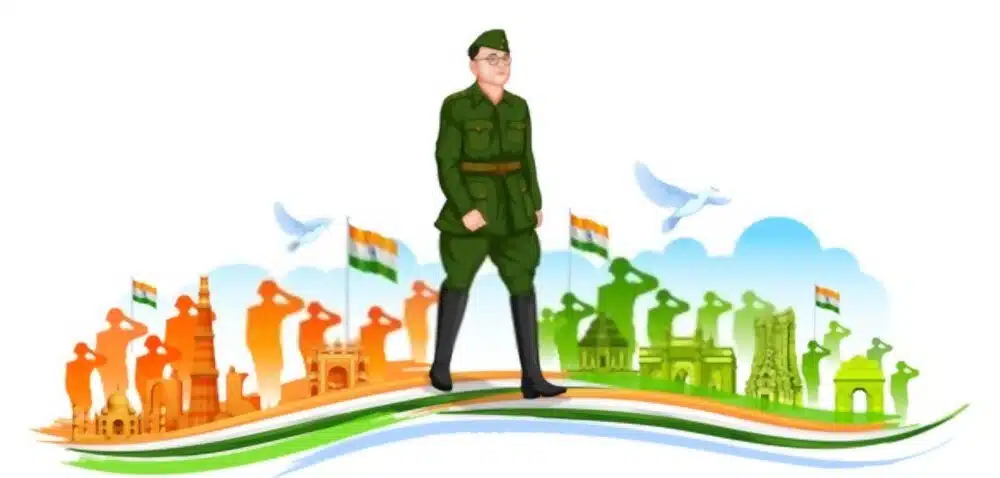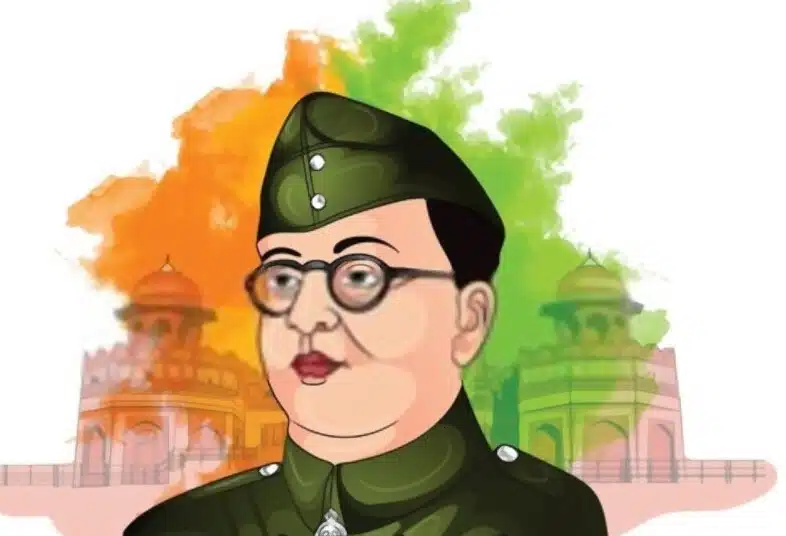Did you know Subhash Chandra Bose once said, “Give me blood, and I shall give you freedom”? This post is for students, teachers, and readers looking for a short note, biography, or essay on Subhash Chandra Bose in simple English. Whether you need a 100-word paragraph, a 150 or 250-word essay, or a full 500+ word life sketch — you’ll find it all here.With years of experience creating school-level content, we’ve kept everything clear, to the point, and exam-ready. You’ll also get a simple biosketch and some inspiring quotes by Netaji Subhas Chandra Bose. Perfect for homework, projects, and general knowledge, this page has everything you need.
Table of Contents
Netaji Subhas Chandra Bose Paragraph in 100 Words
Subhash Chandra Bose is commonly known as Netaji. He was one of the most prominent leaders in India’s struggle for independence. Since his childhood he had been a brilliant student. His determination has been a source of inspiration for generations.
He advocated militant resistance against colonialism. He took controversial decision of seeking help from Axis powers during World War II to achieve India’s freedom.
There is no denying that Subhash Chandra Bose played an instrumental role in shaping India’s destiny. He cemented India’s place on the global stage. The story of his struggle is long. He is truly called India’s most legendary freedom fighter. His fierce determination overthrew British rule from India.
Short Essay on Subhash Chandra Bose in 150 Words
Subhash Chandra Bose was a prominent Indian nationalist leader. His role was instrumental in India’s struggle for independence from British rule. Born on January 23, 1897, in Cuttack, Odisha, Bose had a keen interest in politics from a young age. He actively participated in the freedom movement.
He is best known for his formation of the Indian National Army (INA) during World War II with the help of Japan to fight against British forces. He believed that armed revolution was necessary to achieve India’s independence and he worked tirelessly towards this goal.
Bose was not only a great leader but also an intellectual with strong principles and beliefs. His speeches and writings reflected his deep love for his country and his determination to free India from colonial rule.
Despite facing many challenges throughout his life, Bose remained committed to achieving freedom for his people until he died tragically at just 48 years old. Today we remember Subhash Chandra Bose as one of India’s most revered heroes who fought for us.
Also Read:
- Bio Sketch for Class 6: Format, Writing Tips, Examples and Practice Questions
- Bio Sketch for Class 8: Smart Format, Useful Words, Solved Examples and Practice Questions
- Bio Sketch Writing for Class 5 – Format, Examples, & Easy Tips
- Biography Writing for Class 10: Format, Examples, and Practice Exercises

Essay on Subhash Chandra Bose in 250 Words
Subhash Chandra Bose, popularly known as Netaji, was a great leader of the Indian independence movement. He grew up with a strong sense of patriotism and national identity. Bose studied at the University of Calcutta before joining the Indian National Congress where he quickly rose through the ranks to become its President.
However, his radical views on India’s independence led to conflict with other leaders within the party and eventually caused him to split from it.
Subhash Chandra Bose then formed his own party called Forward Bloc which advocated for complete independence from British rule through non-violent means.
Despite this commitment to non-violence, Subhash Chandra Bose felt that more extreme measures were necessary when World War II broke out. He sought help from Nazi Germany and Japan in forming an army (the Azad Hind Fauj) dedicated to freeing India from British rule by force if necessary.
His famous slogan “Give me blood and I will give you freedom” became a rallying cry for those who believed that peaceful negotiations had failed them. Bose’s leadership style was characterized by fierce determination, boldness, and charisma; he inspired countless Indians across class lines with his vision for their country’s future free from colonialism.
Although many criticized him for seeking aid from countries aligned with fascist ideologies during World War II, there is no doubt that Subhash Chandra Bose remains one of India’s most iconic figures – a symbol of unrelenting resistance.
He suffered a lot for us including imprisonment by the British government multiple times and exile from India due to political differences with other leaders of the time. This is the reason his sacrifice continues to inspire generations even today.
Subhash Chandra Bose Quotes
Subhash Chandra Bose quotes are some of the most powerful and thought-provoking statements that reflect his vision for India’s future. These quotes are filled with inspiring messages about patriotism, courage, and sacrifice to insightful advice on leadership and governance. One such quote is-
“Give me blood, I will give you freedom,”
This statement reflects Bose’s unwavering commitment towards achieving India’s independence at any cost. Another notable quote by him is.
“Freedom is not given – it must be taken.”
This statement highlights the importance of active participation in fighting for one’s rights rather than waiting for someone else to grant them freedom. Subhash Chandra Bose also emphasized building strong institutions that can withstand challenges while empowering citizens with knowledge and skills needed for success. He said,
“The secret of political bargaining is to look stronger than what you really are.”
This quote shows his astute understanding of power dynamics between nations and how weaker countries can play their cards smartly when dealing with stronger ones.

Subhas Chandra Bose Biography in English – 500+ Words
Subhash Chandra Bose, one of the most celebrated revolutionary leaders in Indian history, deserves a special place in our hearts and minds. His contribution to India’s independence movement is second to none, and his unwavering determination and bravery continue to inspire people even today.
This essay on Subhash Chandra Bose, focuses on a closer look at his life, His leadership of the Indian National Army (INA) and his mysterious death and legacy that continues to resonate with millions of Indians across the world. So let’s dive into the fascinating story of this iconic leader
Early life of Subhash Chandra Bose

Subhash Chandra Bose was born in Cuttack, Orissa, India on January 23, 1897. His father Janakinath Bose was a prominent lawyer and his mother Prabhavati Devi was a devout housewife who instilled in him the values of selflessness and courage from an early age.
Bose had a brilliant academic record and graduated with flying colors from Calcutta University before pursuing further studies at Cambridge University in England. However, he soon became disillusioned with the British education system and left without completing his degree.
Upon returning to India, Subhash plunged into politics and joined the Indian National Congress party under the leadership of Mahatma Gandhi. He quickly emerged as one of its most dynamic leaders due to his charismatic personality and fiery speeches that inspired millions of Indians across the country.
Despite facing numerous obstacles along the way, including imprisonment by British authorities for his anti-colonial activities, Subhash remained committed to achieving complete independence for India through any means necessary.
His involvement in Indian Independence Movement
Subhash Chandra Bose had a deep sense of patriotism and was dedicated to the cause of India’s independence from British rule. He joined the Indian National Congress in 1921 and soon became an active member, advocating for complete independence rather than just dominion status.
Bose disagreed with Gandhi’s non-violent approach and believed that India needed to use force to gain its freedom. In 1928, he organized a protest the Simon Commission, which was appointed by the British government to investigate constitutional reforms in India.
In 1930, Bose was arrested for participating in the Salt Satyagraha movement led by Gandhi. But even while being imprisoned multiple times over several years, he continued his fight for Indian independence.
After becoming President of Congress in 1938, Bose faced opposition from other leaders who preferred negotiation with Britain rather than confrontation. Disillusioned with Congress leadership, Bose left Congress and formed Forward Blocin 1939 – a party committed to achieving complete independence through any means necessary including armed struggle.
Subhash Chandra Bose played a crucial role as one of India’s most prominent freedom fighters whose determination towards seeking Independence inspired many others across generations.
His time as the leader of Indian National Army
Subhash Chandra Bose’s leadership of the Indian National Army (INA) is one of the most intriguing and controversial periods in his life. After being expelled from Congress, Bose decided to take a more radical approach towards India’s independence struggle. He formed the INA with Japanese support during World War II.
The INA was initially made up of prisoners-of-war captured by the Japanese from British Indian Army units. However, it grew rapidly in numbers as many Indians living in Southeast Asia joined voluntarily. The INA fought alongside Japanese forces against British and Commonwealth troops in Burma and India.
Bose was known for his charismatic personality and excellent organizational skills, which helped him to transform a ragtag group into an effective fighting force. Under his command, the INA won several battles against Allied forces but ultimately failed to achieve its objective of freeing India from British rule.
Despite its failure on the battlefield, the INA played a significant role in galvanizing public opinion in favor of independence back home. Its members were seen as heroes who had risked their lives for their country’s freedom.
Today, Subhash Chandra Bose remains a controversial figure whose legacy continues to inspire Indians seeking autonomy and self-determination. His time leading the INA will always be remembered as one of his most daring exploits that demonstrated his unwavering commitment to securing India’s freedom at any cost.
His mysterious death
Subhash Chandra Bose’s death is one of the most controversial and mysterious events in Indian history. In August 1945, Bose died in a plane crash while end route to Tokyo, Japan. However, there are many unanswered questions surrounding his death that have led to countless conspiracy theories.
One theory suggests that Bose did not die in the plane crash but instead lived out his life under an assumed identity. Some believe that he may have even faked his own death as part of a plan to continue fighting for India’s independence from British rule.
Others speculate that Bose was killed by British intelligence agents or possibly even by Soviet authorities who saw him as a threat to their interests in Asia.
Despite numerous inquiries and investigations over the years, no definitive answers have been found regarding Subhash Chandra Bose’s mysterious death. This has only added to the legend and mystique surrounding this iconic figure of India’s struggle for independence.
Regardless of how he died, Subhas Chandra Bose left behind a legacy that continues to inspire generations of Indians today. His unwavering commitment and sacrifice for his country will never be forgotten.
Legacy of Subhash Chandra Bose
Subhash Chandra Bose’s legacy is a testament to his unwavering commitment towards the Indian independence movement. Despite facing various challenges, he refused to back down and continued fighting for his country. His leadership of the Indian National Army inspired many young revolutionaries who followed in his footsteps.
Bose’s contributions were not limited to India alone; he also played an instrumental role in building strong diplomatic ties with Japan and Germany during World War II. He was known for his courage, determination, and vision for a free India.
Even after his death, Subhash Chandra Bose has remained an iconic figure in modern-day India. His legacy continues to inspire generations of Indians who strive towards building a better future for their country.
Subhash Chandra Bose was more than just a freedom fighter; he was a visionary leader whose contributions continue to shape India’s political landscape today. His fearless spirit and unrelenting dedication are an inspiration not only for Indians but for people all over the world who aspire towards achieving true freedom and justice.
FAQs
1.How did Netaji Subash Chandra Bose die? Why is it mysterious?
OR
What is the truth behind the death of Netaji Subhas Chandra Bose? How did he disappear? What was the political scenario at the time of his death?
Ans :The death of Netaji Subhas Chandra Bose, a prominent figure in India’s struggle for independence, is indeed surrounded by mystery and controversy. Netaji Bose died on August 18, 1945, under disputed circumstances.
According to the officially accepted version of events, Bose died in a plane crash in Taipei, Taiwan (then known as Formosa), while enroute to Japan. It is believed that his overloaded plane crashed shortly after takeoff, resulting in fatal injuries that led to his death. This account is based on the findings of the Shah Nawaz Committee, which was appointed by the Indian National Congress in 1956 to investigate Bose’s death.
However, the circumstances surrounding Bose’s death have been the subject of numerous conspiracy theories and doubts. Some theories suggest that he did not die in the plane crash and instead lived in hiding for several years. These theories propose that he assumed a different identity and continued to work towards India’s independence.
The absence of concrete evidence and conflicting accounts have fueled the mystery surrounding Bose’s death. Various investigations and inquiries have been conducted over the years to uncover the truth, including the Mukherjee Commission set up in 1999 by the Indian government. This commission challenged the official account and concluded that Bose did not die in the plane crash but instead survived and lived in secrecy.
Despite these controversies, the exact circumstances of Netaji Subhas Chandra Bose’s death remain inconclusive. The mystery continues to captivate public interest, and the search for definitive answers continues to this day.
2. What are some famous stories about Netaji Subhash Chandra Bose?
Answer- The Great Escape from British Captivity:
One of the most famous stories about Netaji Bose is his audacious escape from British captivity in 1941. While under house arrest in Kolkata, he disguised himself as a Pathan and fled to German-occupied Europe to seek international support for India’s independence. Bose’s escape involved a perilous journey by train, car, and a submarine, ultimately leading him to reach Germany and establish contacts with the Axis powers.
3. The Formation of the Indian National Army (INA):
Answer- Netaji Bose’s efforts to free India from British rule led him to establish the Indian National Army (INA) in 1942. With the support of the Axis powers, Bose organized and trained Indian soldiers who had been prisoners of war in Southeast Asia. The INA, also known as Azad Hind Fauj, played a crucial role in fighting against the British Indian Army in Burma (now Myanmar) and Northeast India. The formation of the INA remains a significant chapter in India’s struggle for independence.
4. The “Give Me Blood, and I Shall Give You Freedom” Speech:
Answer- In 1944, Netaji Bose delivered his powerful speech known as the “Give Me Blood, and I Shall Give You Freedom” address in Burma. This passionate speech aimed to inspire the Indian masses to join the freedom struggle and fight against British colonial rule. The speech resonated with people across India and served as a rallying cry for the cause of independence. It highlighted Bose’s charismatic leadership and his ability to connect with the aspirations of the Indian people.
These incidents illustrate the daring and determined spirit of Netaji Subhash Chandra Bose, showcasing his relentless pursuit of India’s independence and his willingness to take bold actions in the face of adversity.
5. Why are there no movies on Subhash Chandra Bose?
Answer- There have been movies made on the life and legacy of Netaji Subhash Chandra Bose, although their number may be relatively limited compared to some other historical figures. Several factors contribute to this observation:
Limited historical documentation: The mysterious circumstances surrounding Netaji Bose’s life and his untimely death have led to a scarcity of concrete evidence and historical documentation. The lack of definitive information can make it challenging for filmmakers to create a comprehensive and accurate portrayal of his life. This uncertainty might have influenced the decision-making process for movie productions.
Controversial and sensitive subject matter: The legacy of Netaji Bose is still a matter of debate and controversy in some circles. Different perspectives and interpretations exist regarding his ideology, his actions during World War II, and his relationship with the Axis powers. Filmmakers may approach such a sensitive subject matter with caution, as they may face challenges in representing historical events objectively while respecting diverse viewpoints.
Production and financial considerations: The production of historical films often requires substantial resources, including finances, research, and visual effects. The perception that films on historical subjects might not generate high box office returns compared to other genres could influence the decision of production studios. Consequently, fewer films might be made on relatively lesser-known historical figures such as Netaji Bose.
Despite these factors, there have been notable film adaptations that depict aspects of Netaji Bose’s life and the Indian independence movement. For example, the film “Netaji Subhas Chandra Bose: The Forgotten Hero” (2005), directed by Shyam Benegal, portrays Bose’s life and his role in the freedom struggle. Other documentaries and television series have also explored his story. As the interest in historical narratives continues to grow, it is possible that more films will be made in the future to depict different facets of Netaji Subhash Chandra Bose’s life and contribute to a better understanding of his legacy.